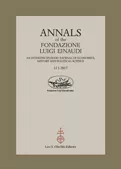This article considers Pigou’s handling of Nietzsche’s criticism of morality. His reception of Nietzsche was remarkably sympathetic, because Pigou too criticised hedonistic utilitarianism and reacted to nihilism. Pigou considered the Übermensch as the German philosopher’s most important contribution, being an antidote to the nihilistic approach to life originated by the crisis of traditional religious values. Pigou examined it with reference to the ideal of intrinsic goodness pursued in most of his early philosophical writings in accordance with G.E. Moore’s Principia Ethica, another cornerstone of his philosophical formation. Arguably inspired by Nietzsche’s condemnation of democracy and egalitarianism, some of Pigou’s writings endorsed eugenic principles and revealed an ambivalent attitude toward political and economic inequality, in contrast with his more famous arguments in favour of income redistribution in Wealth and Welfare and The Economics of Welfare. Pigou’s writings also reveal his awareness of the complex relationship between economic welfare and well-being, a distinction possibly influenced by Nietzsche’s accusation of British political economy for its shallow view of happiness.



